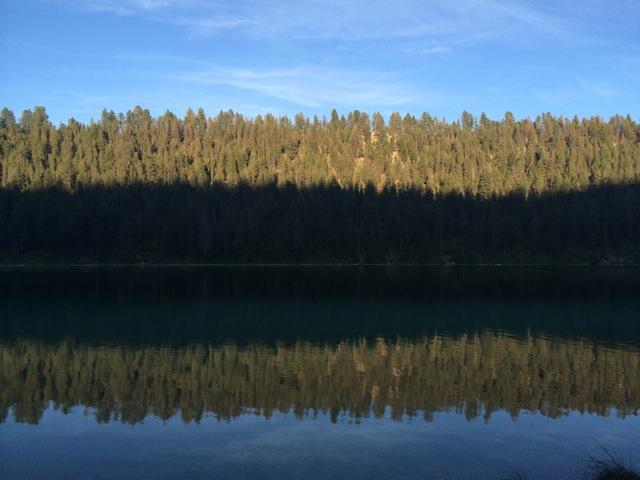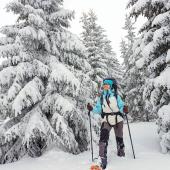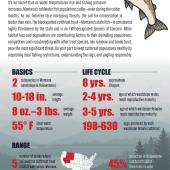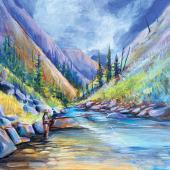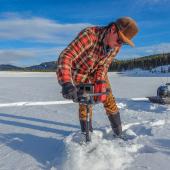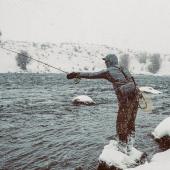Peace in the High Country
The sun is high overhead as I step out of the trees. I drop my pack, flop down on the grass, and watch the wind send long ripples across the lake as Bear, my furry, four-legged companion, quenches his thirst in the cool water.
We've been hiking all morning, and while my legs and lungs feel the mileage, the thick pine canopy has shielded me from the intense summer sun during the ten-mile walk up from the trailhead. Exposed now to its flaxen warmth, I feel languid and dreamy. We have all weekend to fish, I think to myself as I close my eyes and drift off.
I awake to see that Bear has started fishing without me. He's stalking the shallows, ears perked forward, head snapping left and right as sleek cutthroats dart away at his approach. I can't help but smile. This is exactly why we hiked for five hours, climbing almost 4,000 feet, to fish this remote alpine lake. Nobody's here to complain about him spooking the fish.
A few weeks earlier, we'd taken a trip to the Beaverhead River near Dillon. It being summer, the spot I'd chosen was a popular one; by 8:30 am there were fishermen lined up at uncomfortably close intervals over the entire 200-yard stretch of water. I'd squeezed into a good spot and had just hooked a nice rainbow when I heard an angry voice behind me.
"I'm gonna kick that damn dog," came the gruff proclamation, and I turned to see a heavyset man wading toward the bank, where Bear had his nose buried in the man's gear, searching for a snack, perhaps, or whatever else dogs always search for in piles of human stuff.
I intentionally broke off my fish (a painful choice, what with flies costing more per ounce than gold these days), and it had taken all my patience and every bit of diplomacy I could muster to avert streamside fisticuffs, a grim proposition given the cold water and swift current of the river. In the end, I'd taken Bear back to the truck and had sacrificed choice spots on the river several times throughout the day as I looked in on him and checked his water dish.
But up here in the mountains, far away from the noise of rumbling truck engines, driftboats being unloaded, and men cursing as they lose big fish, there are no annoyed fishermen to placate, nobody's personal space to invade. This mountain lake belongs to Bear and me for the weekend. We have only ourselves to bother, and only ourselves to please.
As I set up camp and collect firewood, with Bear carrying off sticks almost as fast as I can gather them, I wonder why more people don't fish the high country. The fishing can be great, and the solitude unparalleled. And up here, epiphanies ride the wind.
Fishing is one of those outdoor activities that can actually foster epiphanies, those rare moments of lucidity where one catches a glimpse of totality, its meaning, and one's place within it. "Yes. I see it. I feel it," you announce to everyone, and to no one. It's as if you're wired into the universe, feeling its pulse, flowing through its veins in an uninterrupted stream of energy. And then, like a passing memory or a mild bout of melancholy, it slips away, leaving only a vague and indescribable feeling, and a hope for its return. So you keep fishing, and you wait.
Up here the epiphanies seem to come more often; with the distractions removed, the conditions are more conducive. I see not only myself, but other creatures, other species with ancestors much older than mine. The soaring eagle, the nimble otter—fellow fishermen and fellow dreamers—what do their epiphanies tell them? What do they see with a collective unconscious one million years old?
The weekend is long. Bear and I fish at a leisurely pace, keeping a few fat cutthroats for dinner: browned over an open fire, hand-peeled off the bones, and shoved into the mouth in huge portions. I wipe my face on my sleeve and lay by the fire, gazing at the stars above. I vow to learn more constellations before my next trip, and I drift off, thinking of a day when I'll be able to recall an epiphany, and communicate it to the angry man who kicks a curious dog.

